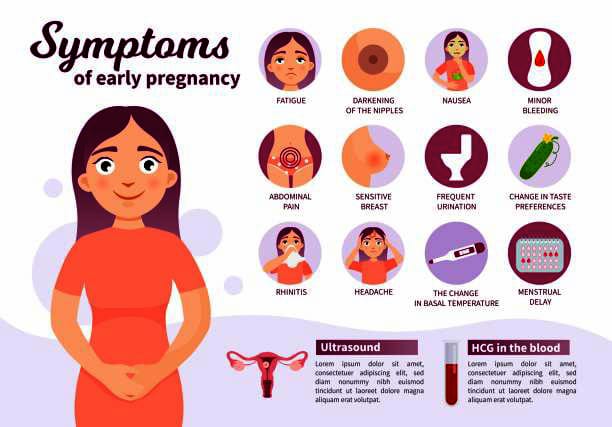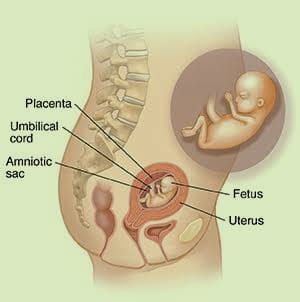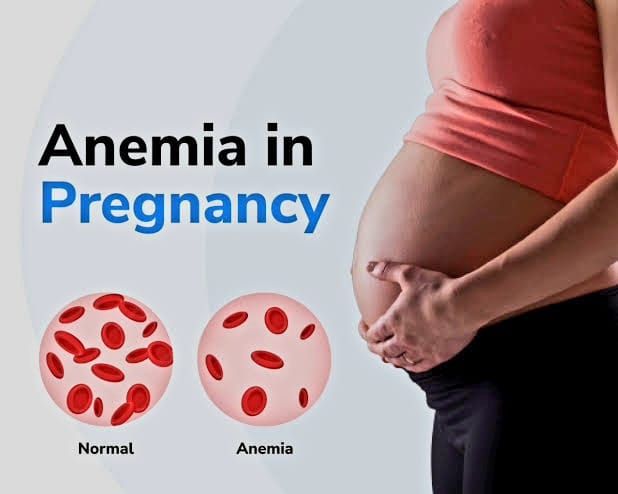Symptoms and Risks to pregnancy During First Trimester
Symptoms: Some of the common symptoms are:
Nausea (Morning Sickness): It is commonly defined as nausea and vomiting, can strike at any time of day. Pregnancy normally peaks around week six, and it might last into the second trimester.
Weariness: Pregnant women may have increased degrees of weariness due to elevated progesterone levels.
Breast Changes: Tenderness, swelling, and fullness might appear in the breasts. Veins may become more visible and the areolas, the black region surrounding the nipples, may darken.
Weight: During the first trimester, some women may begin to gain a little weight.
Heartburn: Elevated progesterone may cause the esophageal-gastric valve to relax, resulting in heartburn.
Urinating More Frequently: As the uterus grows, the bladder experiences pressure, which increases the frequency of urine.
Constipation: The slowing down of the digestive system due to hormonal fluctuations can cause constipation.
Appetite and aversions to food: Your sense of taste may alter and you may become more sensitive to particular oduors when you are pregnant. Hormonal changes can be the cause of dietary preferences, just like they are for most other pregnant symptoms.
Risks To a Pregnancy During First Trimester
Although the first trimester of a pregnancy might present certain hazards and possible problems, most pregnancies go normally.
- Diseases: A growing fetus may be at danger from illnesses including rubella, toxoplasmosis, and certain sexually transmitted infections. Pregnant women should maintain proper hygiene and get medical help if they think they may be infected.
- Birth abnormalities: Because the first trimester is so important for organ development, there is an increased risk of birth abnormalities if certain drugs, diseases, or chemicals are exposed at this time. For this reason, it is imperative that expectant mothers stay away from dangerous medications and take their prenatal vitamins as directed.
- Maternal Health problems: The growing fetus and the mother may be at danger from certain maternal health problems, including as diabetes and hypertension. During pregnancy, these problems must be well managed and observed.
- Ectopic Pregnancy: When a fertilized egg implants outside of the uterus, typically in the fallopian tube, it results in an ectopic pregnancy. This ailment has to be treated right away since it has the potential to be fatal.
- Substance Use: Using tobacco, alcohol, and recreational drugs, among other substances, might raise the chance of pregnancy-related problems. It is crucial that expectant mothers abstain from these drugs for the benefit of the unborn child.
- Miscarriage: The loss of a pregnancy before the 12 week is known as a miscarriage or spontaneous abortion. It is very typical, particularly in the first trimester of pregnancy. The majority of miscarriages happen in the first trimester, sometimes before the mother even realizes she is expecting. Chromosome abnormalities are the cause of many miscarriages.
- Uncontrolled Diabetes: Uncontrolled diabetes increases the risk of problems and birth abnormalities during pregnancy. It is imperative that pregnant women with diabetes maintain appropriate blood sugar levels.
- Use of Medication: During the first trimester, several drugs may provide dangers to the growing fetus. If a woman is expecting, she should speak with her doctor before taking any prescription, including over-the-counter treatments.
Common Pain During First Trimester
Your ligaments become more pliable due to pregnancy hormones that help your body prepare for the growing fetus. Additionally, the flexibility permits your bones to enlarge during birthing. You are also bearing the extra weight of the fetus at the same time. When combined, these factors might cause physical strain and pain.
- Round Ligament Pain: The discomfort in your belly, hips, or groin area may be acute and originate from the round ligament, which supports your uterus. It might be felt on one or both of your body sides.
- Ectopic pregnancy: An ectopic pregnancy might be the cause of this type of pain. This occurs when a fertilized egg implants itself, generally in one of the fallopian tubes, outside the womb. Usually, between weeks four and twelve, it is observed.
- Stomach Pain: During the first 12 weeks of pregnancy, mild stomach pain is often brought on by one of the following: hormones, constipation, trapped wind, or your womb enlarging. Period discomfort or a “stitch” may be the only sensation experienced occasionally. If you have slight pain that subsides with movement, rest, bowel movements, or breathing exercises, there’s generally no need to concern.
- Bleeding During First Trimester: Before 12 weeks, it’s normal to experience little bleeding, or “spotting,” without any discomfort. Even while bleeding is usually not a significant concern, you should still get checked out by your GP, doctor, midwife, or Early Pregnancy Unit away. Recall that a large number of pregnant women who have bleeding during the first 12 weeks of their pregnancy go on to have a healthy pregnancy. Just make sure that when the bleeding starts, your symptoms are evaluated.
- Headaches During First Trimester: Hormones might be the source of mild headaches, which are typical throughout pregnancy. It is okay to take paracetamol for minor headaches. Be sure to adhere to the directions on the package on the maximum amount you should take. Make an effort to take paracetamol at the lowest possible dose for the shortest possible duration. If the pain persists and is not relieved by paracetamol, you can speak with your midwife, general practitioner, or chemist for more guidance. Early in your pregnancy, you should attempt to minimize dehydration by drinking at least 8 to 10 glasses of fluid each day, get adequate sleep, and maintain a healthy, balanced diet to prevent and manage headaches. Relaxation and sleep are equally vital.
- Vaginal Discharge During First Trimester: During pregnancy, hormones and an increased blood flow cause your vagina to secrete more than usual. The typical vaginal discharge is odorless, clear, and white. When applied to your panty liners or knickers, it may seem yellow.
Pregnancy Complication During First Trimester
Pregnancy complications can occur for a variety of causes. A woman pre-existing medical issues might occasionally exacerbate issues. Other times, pregnancy-related changes in the body and hormones lead to the development of new disorders.
If you have any worries regarding the possibility of difficulties throughout your pregnancy, don’t hesitate to consult your doctor.







